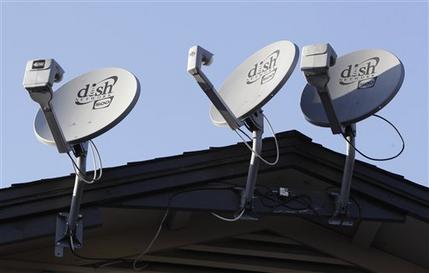Dish Files Bad Faith Complaint as Blackout With Tegna Continues
Satellite company claims broadcasters wants it to pay for viewers who are no longer subscribers

The smarter way to stay on top of broadcasting and cable industry. Sign up below
You are now subscribed
Your newsletter sign-up was successful
Dish Network said it filed a complaint with the Federal Communications Commission charging that Tegna is not negotiating a new retransmission deal in good faith.
Tegna stations have been blacked out to Dish‘s satellite TV subscribers since Oct. 7.
Tegna called the complaint "utterly baseless and without merit.
Dish claims that Tegna has been stonewalling negotiations and has made unreasonable and inconsistent demands.
“Tegna turned its back on its public-interest obligation and failed to engage in good faith retransmission consent negotiations with Dish,” said Andy LeCuyer, Dish senior VP of programming. “Tegna’s demands were both unreasonable and inconsistent. This behavior negatively impacts Dish subscribers, and we expect Tegna’s bad behavior to only get worse as the programmer looks to sell its stations to the highest bidder. As a result, we have filed a formal complaint with the FCC to address Tegna’s blatant disregard of the Commission’s rules.”
Last month, Tegna said it received bids to buy the company and is reviewing the proposals.
In its complaint, Dish said that Tegna’s appeared to demand that Dish pay for all subscribers in a local market whether they purchase local programming from Dish or not. It also appeared to demand that Dish pay for viewers who no longer subscribe to the satellite TV platform.
The smarter way to stay on top of broadcasting and cable industry. Sign up below
Tegna’s demands would have totaled nearly $1 billion in fees, the Dish filing said.
In a statement, Tegna said it welcomes a chance for the FCC to review Dish's conduct during the negotiations.
"Perhaps a close examination of DISH’s conduct will cause them to come to the table to negotiate free from their consistently unproductive tactics and public misrepresentations," Tegna said.
Tegna said it made a comprehensive proposal to Dish months ago. It updated the proposal "multiple times," including a "reduction in rates." Tegna said Dish has refused to counter and has not proposed rates in more than three weeks.
Tegna noted that Dish has a history of being blacked out when retransmission contracts come to an end.
"The unfortunate reality is that Dish dropped more than 230 channels last year alone and is now repeating that pattern by refusing to reach an agreement with Tegna, depriving its customers nationwide of some of the most valued programming on TV," Tegna said. "Rather than engage in transparent PR stunts, DISH should return to the negotiating table in a serious fashion and get a deal done before their subscribers are forced to endure yet another week without their favorite shows, valued local news, as well as marquee college football and NFL matchups.”
Historically complaints citing failure to negotiate in good faith have been nonstarters. Though they were not unusual as negotiating parties jockeyed for leverage, up until this year none had succeeded.
Such complaints have generally been dismissed for failing to show the negotiations were not in good faith, or dropped after the parties involved reach an agreement and publicly bury the hatchet, at least for the time being. But the FCC has injected new life into the tactic by actually taking action.
Back in July, the FCC upheld a $10 million retransmission fine against Sinclair-managed stations for violating the good faith negotiation requirement. All the groups were represented by consultant Duane Lammers of Max Retrans.
DirecTV had alleged that the broadcaster unreasonably delayed retrans negotiations, including failing to respond to AT&T proposals, and the FCC agreed.
The FCC fined each station individually, saying "the harm to viewers is multiplied with each station that goes dark, regardless of the number of corporate parents involved in a carriage dispute, underscoring the importance of our focus on individual stations."
The American Television Alliance, whose members comprise cable and satellite operators that support retransmission consent reforms including the definition of good faith bargaining, put itself squarely behind DISH and its complaint.
“Mammoth broadcast conglomerates like TEGNA must be held accountable as they weaponize blackouts and harm consumers time and again," said ATVA spokesperson Jessica Kendust. "We hope the FCC will recognize this latest incident and put a stop to these egregious tactics in the future.”
John Eggerton contributed to this story.
Jon has been business editor of Broadcasting+Cable since 2010. He focuses on revenue-generating activities, including advertising and distribution, as well as executive intrigue and merger and acquisition activity. Just about any story is fair game, if a dollar sign can make its way into the article. Before B+C, Jon covered the industry for TVWeek, Cable World, Electronic Media, Advertising Age and The New York Post. A native New Yorker, Jon is hiding in plain sight in the suburbs of Chicago.

